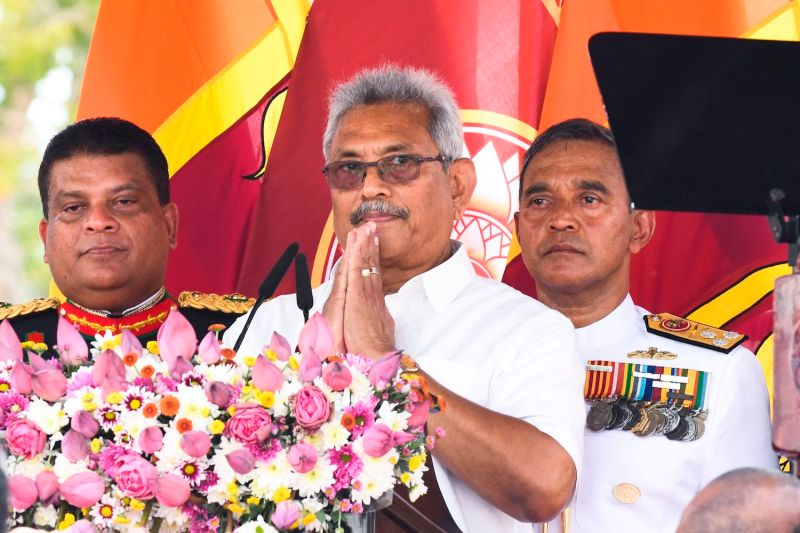During an address to senior Buddhists leaders at the Vibhajjavadi Dhamma Symposium and Maha Tripitaka Pooja on 4 January, Prime Minister Mahinda Rajapaksa stated that the defence of the Buddhist order is central to ensuring unity and the protection of religious freedom of Sri Lankans who profess other faiths. Just one day prior, his brother, President Gotabaya Rajapaksa pledged his commitment before parliament to protect and nurture the Buddha Sasana as part of his government’s policy. In the Sri Lankan context this is often understood as the ‘physical bounds of the land consecrated by the Buddha.’
Buddhism is enshrined in the Constitution of Sri Lanka. Article 9 states: “The Republic of Sri Lanka shall give to Buddhism the foremost place and accordingly it shall be the duty of the State to protect and foster the Buddha Sasana,” while assuring the freedom of thought, conscience and religion to everyone. Furthermore, with a 2003 Supreme Court ruling which affirms that only Buddhism should be protected by the state, Sri Lanka established in law that there is no constitutional guarantee that other religions will receive similar protection.
In 2010 Asma Jahangir, the UN Special Rapporteur on freedom of religion or belief (FoRB) from 2004-2010 raised concerns that, where there is a dominant religion, either through official or ideological patronage, there will be a chance of it being exploited over time, at the expense of other religious minorities. In a 2013 report, Ms Jahangir’s successor, Heiner Bielefeldt, observed that “governments may also instrumentalize religion as a means of shaping and reinforcing narrow concepts of national identity, tapping into feeling of religious belonging for the purposes of strengthening political loyalty.”
Needless to say, that while the leverage of religion over a body politic in the form of official patronage may be considered favourably or of no influence whatsoever, the underlying principle of FoRB is the promotion of religious pluralism by taking a human rights centred approach.
It is the believer (or non-believer) as a rights holder who must be protected rather than the beliefs themselves.
Articles 18 of the International Covenant on Civil and Political Rights (ICCPR) and the Universal Declaration of Human Rights (UDHR) clearly acknowledge the centrality of a human rights approach in order for religious pluralism to succeed. This is quite the opposite from the rhetoric surrounding religious protectionism. For instance, the Organisation of Islamic Cooperation (OIC) has often attempted to and sometimes succeeded in tabling resolutions at the UN HRC, the UN General Assembly (GA) and UN Commission on Human Rights which essentially call for a consensus of ‘defamation of religions’ as an international normative notion. However in 2011, a HRC resolution (16/18) put the issue to rest, stating that international law aims to protect human beings rather than religions or beliefs.
Heiner Bielefeldt has also noted “the idea of protecting the honour of religions is at variance with the human rights approach, which claims due respect for the dignity and rights of human beings rather than protecting religions as such.” At the heart of the UDHR is the ‘inherent dignity’ of all members of the human family. While it is still unclear what the Rajapaksas mean when they talk about ‘safeguarding’ Buddhism, one cannot discount the dangers of discourse which advocates for State motivated initiatives to protect religion per se.
Apprehensions about the pair’s return to the helm of government is understandable, given experiences under the 2005-2015 Rajapaksa administration, during which both men were widely criticised by the UN for their complicity in human rights violations and war crimes. This chapter has not been closed, in fact, the current government has rejected these allegations altogether.
Both men also have a reputation for emboldening and exacerbating Buddhist nationalism and intolerance, which has historically led to the systematic intimidation, harassment and attack of religious minorities.
Under the Sirisena administration (2015-2019), at the 2017 Universal Periodic Review (UPR), Sri Lanka accepted the recommendation to “increase efforts to guarantee and protect freedom of religion and belief in line with its obligations under the International Covenant on Civil and Political Rights.” Sri Lanka also accepted eight other recommendations directly related to the protection of the right to freedom of religion or belief.
However, during a visit to the country in 2019, the current Special Rapporteur on FoRB, Dr Ahmed Shaheed, raised concerns that Sri Lanka had become rife with identity politics. In conversations with his interlocutors he found that prominence was given to one specific religion and ethnicity over others, leaving members of other religious communities feeling excluded by the State.
It is no wonder that, at the announcement of the 2019 Presidential election, Buddhist nationalists claimed victory and reinforced their open association with the Rajapaksas.
With an indeterminate lack of transparency over the brothers’ responsibility for serious human rights violations, and a latency in transitional justice, there are serious questions about the truthfulness of any rhetoric on peacebuilding and social harmony in State led projects.
A critical question, however, is whether the Rajapaksas will now be campaigning more intensely to prescribe a state model that firmly combines religion and ethnicity and what that enterprise would look like.
